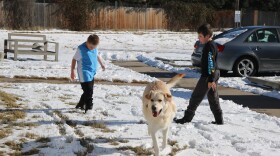
Emma VandenEinde
General Assignment ReporterI'm the General Assignment Reporter for KUNC, here to keep you up-to-date on news in your backyard. Each town throughout Northern Colorado contains detailed stories about its citizens and their challenges, and I love sitting with members of the community and hearing what they have to say.
I was formerly KUNC's Reporter for the Mountain West News Bureau — a regional reporting collaboration between several NPR-affiliate stations across the West. Before coming to Colorado, I worked for Arizona PBS and KJZZ, the NPR-affiliate station in Arizona — so public media is running through my veins.
My sound-rich spot work on the Great American Beer Fest recently won first place at the 2025 PMJA Awards. The feature I contributed to our Unseen But Everywhere series about housing insecurity and education among Colorado youth won top honors at the 2025 Regional Edward R. Murrow Awards, the 2025 Colorado Broadcasters Association Awards and the Top Of The Rockies Awards hosted by the Society of Professional Journalists. I've also been recognized at the National Hearst Championship and the BEA Festival of Media Arts.
When I’m not reporting on your stories, you can find me sinking a disc golf putt, sipping my second cup of black tea or handmaking my own greeting cards.
-
The cost of feeding and caring for our pets has dramatically increased. That's hard to stomach with Colorado's high cost of living. But the guilt of not caring for these animals remains.
-
A bill to curb noise and remove electronic billboards at Colorado State University has its first hearing on Thursday at the state capitol. It’s trying to resolve a loophole in a local ordinance.
-
Black History is an important part of Colorado's 150 years as a state. These objects tell that storyBlack History is an important part of Colorado’s 150 years as a state. At History Colorado, visitors can see some artifacts that speak to the Black legacy here in an exhibit that shares the state's story in 100 objects.
-
A traveling exhibit from the Smithsonian is making a stop in Breckenridge. Americans looks at the impact that American Indians have had on the nation’s history and identity.
-
Colorado’s elderly population is growing, and many would like to age at home. But their homes are also getting older, needing unaffordable repairs. One senior organization is helping with that.
-
The Greeley History Museum is opening a new exhibit next week that tells the story of two French artists as they travel across the West for the first time during the late 1800s.
-
Students have mixed reactions about the new digital billboards popping up around Colorado State University’s Fort Collins campus.
-
For the first time, Gaylord Rockies pastry chefs made a giant house decorated entirely with gingerbread. It uses more than 2,000 pounds of sugar, molasses and dough.
-
Most Americans only know some of their neighbors. Others know none. The Neighborhood Village Project aims to unite communities by training people to host events and create intentional connections.
-
Your beloved morning 'cup of joe' may be getting a bit pricier at local coffee shops as tariffs are hitting coffee beans.










